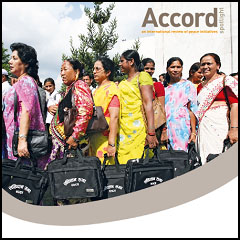- (0)
- 28
Sep -
Author : David Oulton Category : aconvert, Consortium, CR, Gender, Peace Processess, Publication, Report
Tags : case studies publication, converted, Gender, gender publication, Nepal, peace process publication, publication
Gender and Nepal’s transition from war
Citation:
Download report.
Key points:
- Formal participation vs. informal influence: The post-war era has brought clear gains for women in terms of formal political participation and representation. But these have not been matched by women’s ability to influence decision-making. Established male political leaders continue to monopolise major policy negotiations, often outside formal institutions.
- International frameworks: Recourse to international agreements and frameworks on gender equality has provided important impetus for the advancement of women’s rights and progressive policy change. However, national legal frameworks continue to discriminate against women.
- Gender and sexual minority rights: Despite continued legislative barriers and social stigmatisation, remarkable progress in institutionalising sexual and gender minority rights has been achieved through effective mobilisation and advocacy by movements such as the Blue Diamond Society.
- The Maoist insurgency: The Maoists’ commitment to women’s emancipation helped raise awareness and had a significant impact on intersectional inclusion and gender equality in Nepal. However, gains have been offset by limitations regarding gender roles and status, especially within the senior Maoist leadership.
- The Earthquake: A period of intense political change followed the 2015 earthquakes, which has generated ongoing challenges and opportunities for gender inclusion. In the aftermath of the earthquake the 2015 Constitution was rushed through with very limited participation or consultation and with uneven impacts on gender equality. The earthquake relief also exposed serious gaps between policy and programming regarding gender sensitivity.
Abstract: This report reflects discussions from a gender workshop held in Kathmandu, which explored gender relations, equality and Nepal’s transition from war. Focus areas include: affirmative gender action in the transition, gender perspectives on security sector reform, access to justice and political participation; gendered perspectives of marginalised groups, and how different identities intersect. A short case study of the period of intense political change that followed the 2015 earthquakes in Nepal provides an illustrative, contemporary example of opportunities and challenges.
Keywords: Peace Processes; Gender





